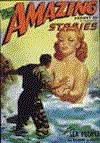|
|
|
New Spielberg film 'A.I.' is ambitious but flawed fable July 5, 2001 By Franklin Harris "A.I. Artificial Intelligence" is a complex and ambitious film, but it isn't without its flaws. The late Stanley Kubrick approached and abandoned the project numerous times. It wasn't until after his death in 1999 that his friend Steven Spielberg decided to finally bring the story to the screen. The resulting film, however, shows why Kubrick never got around to making it. Based loosely on a Brian Aldiss short story, "A.I." is a technological fable. It follows closely the story arc of Carlo Collodi's book, "Pinocchio." David, superbly portrayed by Haley Joel Osment ("The Sixth Sense"), is the first of his kind — an artificially intelligent android boy who can love. And his love is as unquestioning as it is boundless. But therein lies the flaw. Once given a series of code words, David imprints himself onto his human mother (Frances O'Connor), whose real child, Martin, is terminally ill and in cryogenic hibernation. The imprinting is permanent. For as long as he exists, David will love his mother, no matter what. Unfortunately for David, human love doesn't come hard-wired. When Martin (Jake Thomas) is unexpectedly cured, David becomes obsolete. Abandoned by the one person he cannot help but love and inspired by the story of Pinocchio, David begins a quest to become a real boy, thinking that by doing so he can finally gain his mother's affection. Along the way, David encounters Gigolo Joe, played by Jude Law ("Enemy at the Gates"). Joe is an android whose only purpose is to please women. As Joe says, "No two women are alike, and after me no two are ever the same." Together, they escape from a sinister "flesh fair," where android-hating humans dismember lost androids for sport. So, why do humans hate androids so much? As Joe tells us in a scene that is chillingly foretelling, when humanity is gone, the androids will be all that is left. David's search for a real-life Blue Fairy who can turn him into a flesh-and-blood boy echoes Pinocchio's journey of redemption. David even has his own Jiminy Cricket in the form of Teddy, an android teddy bear who offers helpful advice. And like the wooden puppet, David spends time in the belly of a fish, if only metaphorically speaking. But whereas Pinocchio grows as a character during his journey, David cannot. Everything he does is a programmed response. And while Pinocchio has a loving father, David has only the scientist who built him, Professor Hobby, played by William Hurt. Hobby is no Geppetto. He is more of a cross between Dr. Frankenstein and the Wizard of Oz. He is proud when David successfully fulfills his programming, but he doesn't love the robot. And it wouldn't matter even if he did, because David is programmed to love only his mother. As a character, David is a dead end, and so is the film. Unlike Kubrick's other famous artificial intelligence, HAL, David cannot go beyond his programming, if only to go mad. Still, there is much about "A.I." that works. Osment's wonderful performance carries the film, especially in the first segment, when he portrays the still unimprinted android as a creepy automaton. Later on, Osment makes us feel sympathy for David in spite of David's increasingly unsympathetic fixation. Law's Gigolo Joe is also excellent, although the screenplay cannot quite decide if his character is naive or knowing. As for Spielberg, in the early going, he does seem to be channeling Kubrick's spirit. You can see it in a scene transition here and in a camera movement there. Unfortunately, the ending, set in the far future, is unsatisfactory. The film goes from science-fiction fable to full-blown fantasy. Spielberg even gives us an off-screen narrator, who tells us what we are seeing as if reading to us from a children's book. Aldiss has written that Kubrick wanted David to become a real little boy. But getting from android to flesh and blood presents near impossible challenges. Perhaps that is why Kubrick kept walking away in frustration. And perhaps that is why Spielberg ultimately delivers a movie that doesn't quite know what it's trying to tell us. |

RECENT COLUMNS
Order a helping of Cartoon Network's 'Robot Chicken'
03/31/05
Campaign against video games is political grandstanding
03/24/05
Prize-winning author is 'Wrong About Japan'
03/17/05
Censored book not a good start
03/10/05
Some superhero comics are for 'fanboys' only
03/03/05
'Constantine' does well with its out-of-place hero
02/24/05
'80s publisher First Comics' legacy still felt
02/17/05
Director's cut gives new 'Daredevil' DVD an edge
02/10/05
Put the fun back into 'funnybooks'
02/04/05
Is 'Elektra' the end of the road for Marvel movies?
01/27/05
'House of Flying Daggers' combines martial arts and heart
01/20/05
Anniversary edition of 'Flying Guillotine' has the chops
01/13/05
Movie books still have role in the Internet era
01/06/05
Looking ahead to the good and the bad for 2005
12/30/04
The best and worst of 2004
12/23/04
'Has-been' Shatner is a 'transformed man'
12/16/04
© Copyright 2005 PULP CULTURE PRODUCTIONS
Web site designed by Franklin Harris.
Send feedback to franklin@pulpculture.net.